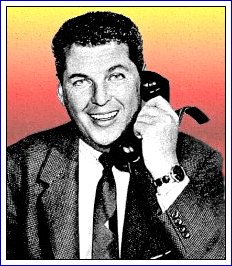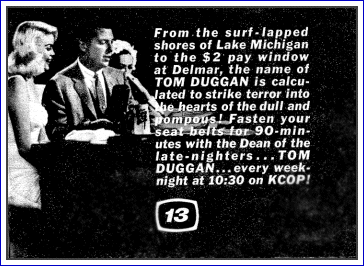
Tom
Duggan

Ad
for his show on KCOP
Tuesday, July 1, 2003
Page 7
PERSPECTIVES (Column)
FBI Documents Show Judge Who Sentenced Tom Duggan Was Linked to Mob
By ROGER M. GRACE
After nearly 50 years, the truth is emerging. FBI documents, obtained by this column through a Freedom of Information Act request, show that the Cook County, Ill. judge who found mob-bashing talk show host/commentator Tom Duggan in contempt and sentenced him to 10 days in jail was linked to the Mafia.
The documents reveal that the late Daniel A. Covelli had a “close connection” to “the underworld” and that the leader of organized crime in Chicago, Sam “MoMo” Giancana, personally exerted influence in an ill-starred effort to get Covelli a federal judgeship during the administration of President Lyndon Johnson.
It was a few years earlier that Covelli effectively removed Duggan from the Chicago airwaves through the contempt adjudication—a potential death sentence, given sentiments of the inhabitants of those quarters toward the commentator who, night after night, berated “hoodlums.” Duggan fled Illinois.
|
|
|
|
He landed in Los Angeles, launching a late-night talk show April 2, 1956 on KCOP, later appearing on KTTV and KTLA, as well as becoming a columnist for the Herald Examiner.
![]()
It was on Nov. 1, 1955, that Covelli instituted the contempt proceedings against Duggan based on his commentaries in connection with a divorce proceeding. Duggan had alleged on the air that the plaintiff-husband, Carl Champagne, as well as his kin, had “court-admitted hoodlum connections.” He also told viewers that Champagne had threatened to publicly identify him as the person designated in the proceeding as the “John Doe” with whom defendant-wife Shirley Champagne had purportedly committed adultery—unless he agreed to “lay off” the mob. (Duggan denied the adultery allegation.)
Covelli refused to allow Duggan to present evidence at the contempt hearing of mob connections of Champagne and his father and uncle, and likewise barred evidence as to the offer to keep his name out of the proceedings if he ceased his televised attacks. With evidence of the truth of the remarks barred, Covelli proceeded to find they “were false.”
Plainly, the judge had an agenda.
The adjudication was upheld by the Illinois Supreme Court. (See “Perspectives,” Aug. 8, 2002, “After 45 Years, Illinois Supreme Court Opinion Still Reeks.”) The United States Supreme Court in 1961 denied certiorari; a U.S. district judge in 1962 invalidated the order of arrest, holding that Duggan’s remarks created no clear and present danger to the administration of justice; the Seventh U.S. Circuit Court of Appeals in 1963 reversed, declaring that the federal trial court lacked jurisdiction.
In the end, Duggan returned to Illinois in the mid-1960s, to attend his father’s funeral, expecting to be arrested, but Covelli relented, vacating his order.
In a column Aug. 9 (“Judge Who Silenced Mob-Bashing Commentator Had Mob Connections”), I noted that Covelli in 1973 wrote a letter to a federal judge in New York urging that he grant a sentence reduction to Allen M. Dorfman. That defendant had been convicted of taking an illegal $55,000 kickback in connection with a deal involving the Teamsters. Covelli tried to explain this away in response to an inquiry by the Chicago Daily News by saying that he really didn’t know Dorfman well, but wrote the letter in light of a 50-year friendship with Dorfman’s late father (actually, stepfather), Paul Dorfman. That was a major slip. Paul “Red” Dorfman had been a central figure in organized crime. (Allen Dorfman also had mob connections, though he wasn’t a major player.)
I also related allegations that Covelli was close to First Ward Alderman Pat Darcy, who headed the mob’s operations in that ward. This quote appeared, from the Web site of the son of a former police chief in Illinois:
“First Ward means mafia. More than a handful of judges in Cook County held their positions because they were ‘Pat’s guys,’ put on the bench by Pat after getting the go-ahead from Sam Giancana or other top mob bosses.”
![]()
Covelli’s association with the mob has now been confirmed.
Among the documents provided by the FBI was a memo of July 29, 1964 from FBI Assistant Director Courtney A. Evans, who was liaison to Attorney General Robert F. Kennedy, to Assistant Director Alan H. Belmont, who was in charge of all investigative work of the bureau.
Evans wrote:
According to an informant Samuel Giancana, leader of the Chicago underworld, is now adding his support to previously reported efforts of the underworld to promote Judge Covelli of the Cook County Circuit Court to a Federal judgeship. We had information earlier in our Criminal Intelligence Program of the close connection between Judge Covelli and the underworld and its desire to place him on the Federal bench.
Recently, in this regard an informant of our Chicago Office advised that Giancana issued orders to all politicians and public officials under his influence to work together in order to assure that Judge Covelli gets the next Federa1 judgeship coming open in the Chicago area.
ACTION:
We informed the Department in 1961 and 1963 of Covelli’s background and of the hoodlums’ interest in him and it is recommended that we also advise the Department as to the information we now have that the top ranking hoodlum of the Chicago underworld is actively promoting Covelli for Federal Judge.
If approved, an appropriate memorandum is attached.
A notation indicated that the attachment, which recited the same information, was sent out the next day. The attachment, itself, specified that it went to Assistant Attorney General Herbert J. Miller Jr. Another document reflected that on Aug. 13, 1965, John T. Duffner, an executive assistant in the Department of Justice, sent a barebones biographical sketch of Covelli (and others) to FBI Director J. Edgar Hoover, making note of the July 30, 1964 Evans-to-Belmont memo (as well as two earlier memos not yet provided to me in response to the FOIA request).
Appended to an Aug. 18, 1965 staff memo to Assistant Director James H. Gale, in charge of the Inspection Division, was an FBI report to the Attorney General’s Office, bearing the previous day’s date, reciting:
“According to information received from confidential sources in 1964 and 1965 Judge Covelli cooperates closely with the hoodlum element in Chicago in connection with matters of interest to them in his court and has acted in some matters on the specific instructions of Giancana. It is known to these sources that care is exercised by Judge Covelli, Giancana and his hoodlum associates to keep Judge Covelli ‘clean’ because of his possible future selection as a Federal judge.”
![]()
I acknowledged in my Aug. 9 column that there was no “direct proof that Covelli, in sentencing Duggan to jail, acted for the purpose of serving or pleasing the local criminal establishment.” There still isn’t.
But it sure does look that way.
A judge found a TV commentator in contempt for commenting. The action defied U.S. Supreme Court precedent that precluded such an adjudication absent circumstances that were patently not present. The commentator persistently slammed the mob on his telecasts. The judge’s action put the mob’s detractor off the air in Chicago. Later FBI memos show “there was close connection” between the judge “and the underworld” and that the judge “cooperates closely with the hoodlum element in Chicago in connection with matters of interest to them in his court.”
The evidence is circumstantial, but, I think, convincing.
None of this, of course, will help Duggan. He died in 1969, at 53, following a traffic accident. (Covelli died in 1976.)
While Duggan might well have suspected that Covelli had ties to the Mafia, it’s doubtful he could have foreseen that someday, then-classified FBI documents would reveal this to have been so.
Copyright 2003, Metropolitan News Company